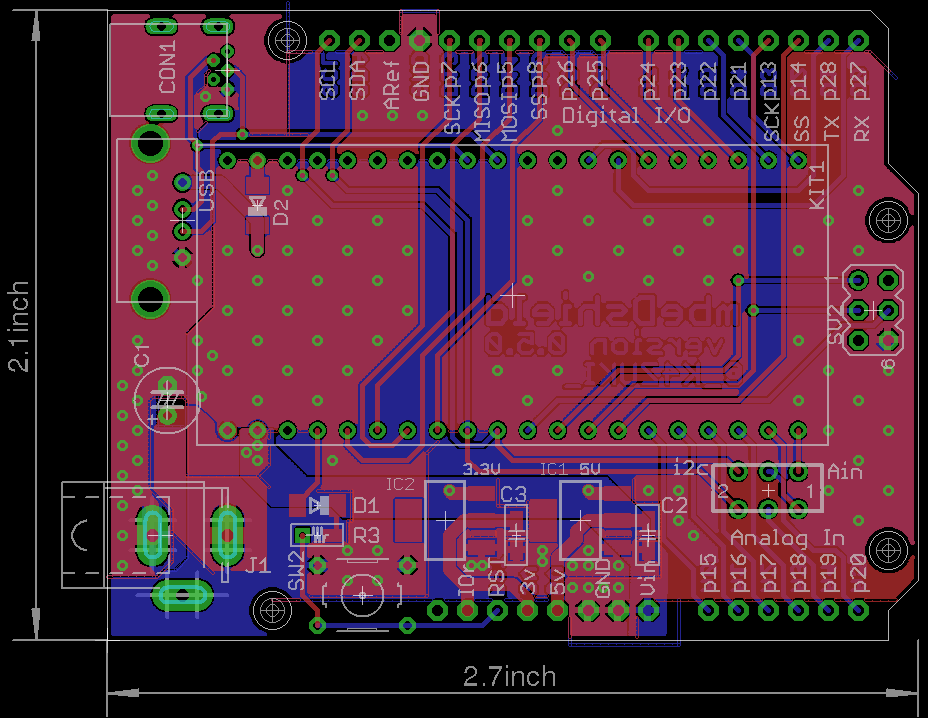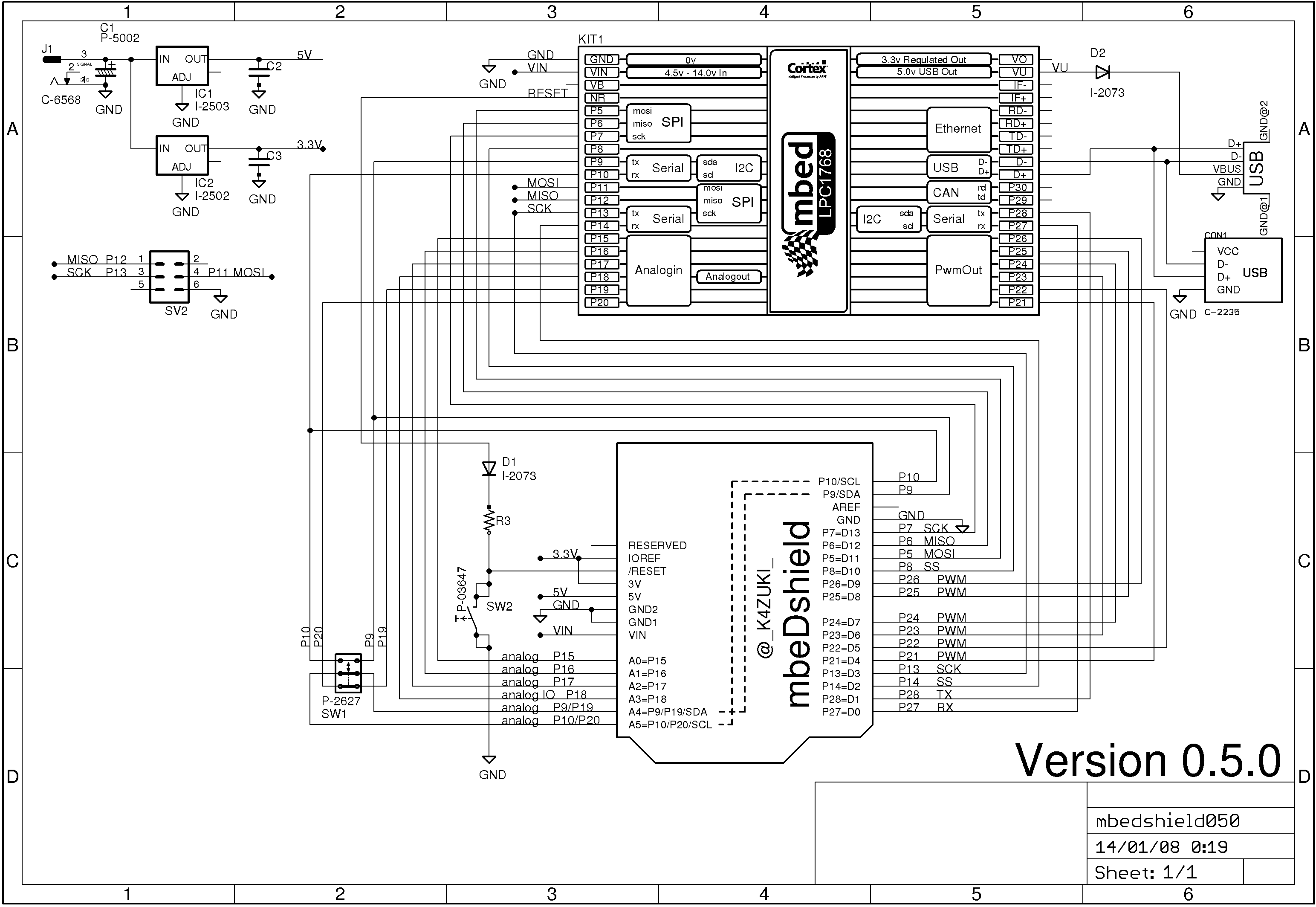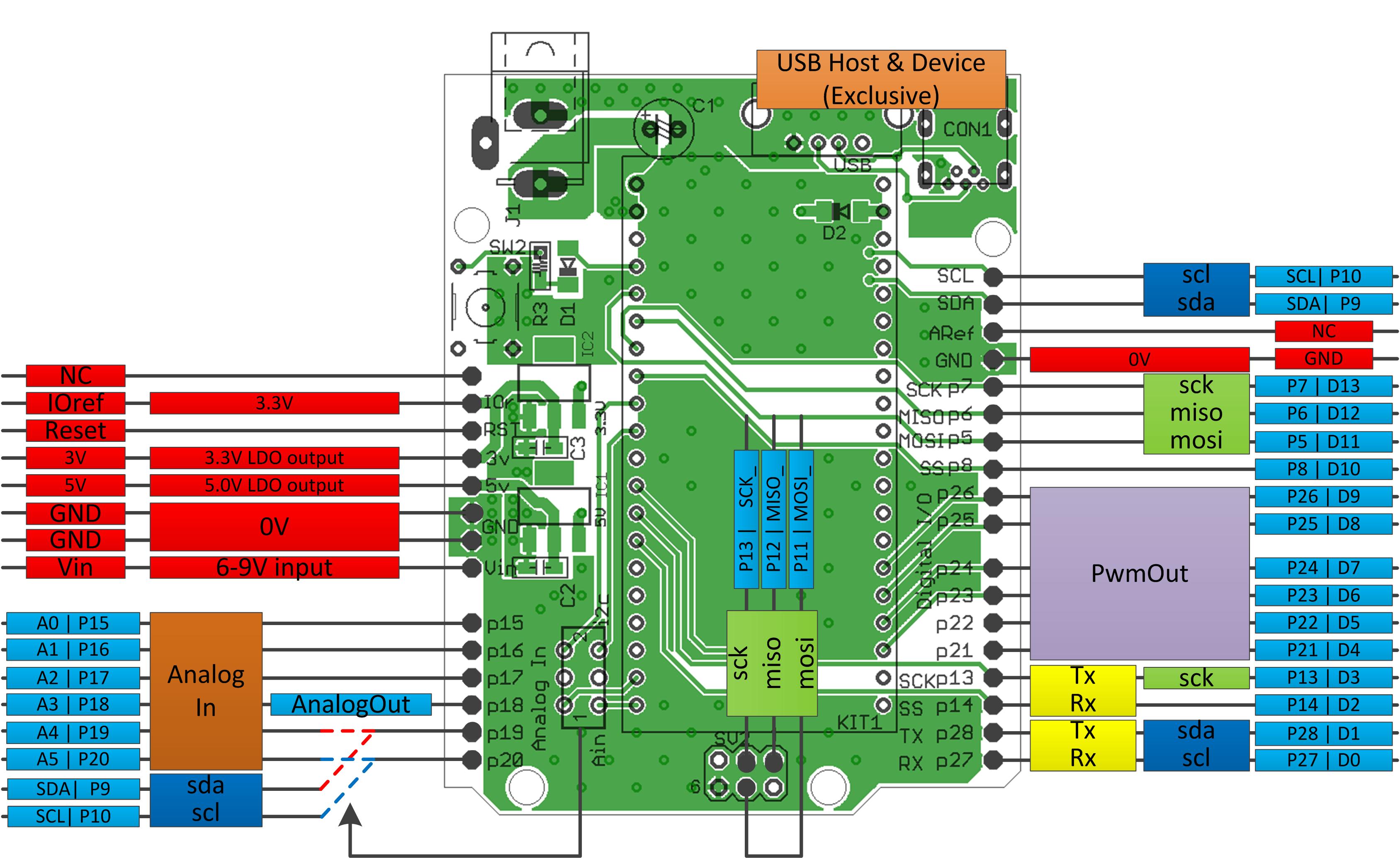The official mbed C/C SDK provides the software platform and libraries to build your applications.
Fork of mbed by
(01.May.2014) started sales! http://www.switch-science.com/catalog/1717/
(13.March.2014) updated to 0.5.0
This is a pin conversion PCB from mbed 1768/11U24 to arduino UNO.
- So if you have both mbed and arduino shields, I guess you would be happy with such a conversion board :)
Photos
- Board photo vvv

- Schematic photo vvv

- Functionality photo vvv

Latest eagle files
PCB >> /media/uploads/k4zuki/mbedshield050.brd
SCH >> /media/uploads/k4zuki/mbedshield050.sch
BIG changes from previous version
- Ethernet RJ45 connector is removed.
- http://mbed.org/components/Seeed-Ethernet-Shield-V20/ is the biggest hint to use Ethernet!
MostALL of components can be bought at Akizuki http://akizukidenshi.com/- But sorry, they do not send parts to abroad
- Pinout is changed!
| arduino | 0.4.0 | 0.5.0 |
|---|---|---|
| D4 | p12 | p21 |
| D5 | p11 | p22 |
| MOSI_ | none | p11 |
| MISO_ | none | p12 |
| SCK_ | none | p13 |
This design has bug(s)
- I2C functional pin differs between 1768 and 11U24.
Fixed bugs here
- MiniUSB cable cannot be connected on mbed if you solder high-height electrolytic capacitor on C3.
- http://akizukidenshi.com/catalog/g/gP-05002/ is the solution to make this 100% AKIZUKI parts!
- the 6-pin ISP port is not inprimented in version 0.4.0
it will be fixed in later version 0.4.1/0.4.2/0.5.0This has beenfixed
I am doing some porting to use existing arduino shields but it may faster if you do it by yourself...
you can use arduino PinName "A0-A5,D0-D13" plus backside SPI port for easier porting.
To do this you have to edit PinName enum in
- "mbed/TARGET_LPC1768/PinNames.h" or
- "mbed/TARGET_LPC11U24/PinNames.h" as per your target mbed.
here is the actual list: This list includes define switch to switch pin assignment
part_of_PinNames.h
USBTX = P0_2,
USBRX = P0_3,
//from here mbeDshield mod
D0=p27,
D1=p28,
D2=p14,
D3=p13,
#ifdef MBEDSHIELD_050
MOSI_=p11,
MISO_=p12,
SCK_=p13,
D4=p21,
D5=p22,
#else
D4=p12,
D5=p11,
#endif
D6=p23,
D7=p24,
D8=p25,
D9=p26,
D10=p8,
D11=p5,
D12=p6,
D13=p7,
A0=p15,
A1=p16,
A2=p17,
A3=p18,
A4=p19,
A5=p20,
SDA=p9,
SCL=p10,
//mbeDshield mod ends here
// Not connected
NC = (int)0xFFFFFFFF
Serial.h
- Committer:
- simon.ford@mbed.co.uk
- Date:
- 2008-04-30
- Revision:
- 1:6b7f447ca868
- Parent:
- 0:82220227f4fa
- Child:
- 4:5d1359a283bc
File content as of revision 1:6b7f447ca868:
/* mbed Microcontroller Library - Serial
* Copyright (c) 2007-2008, sford
*/
#ifndef MBED_SERIAL_H
#define MBED_SERIAL_H
#include "Stream.h"
namespace mbed {
/* Class: Serial
* A serial port (UART) for communication with other serial devices
*/
class Serial : public Stream {
public:
/* Group: Configuration Methods */
/* Constructor: Serial
* Create a Serial port, connected to the specified transmit and receive pins
*
* Variables:
* tx - Transmit pin
* rx - Receive pin
*
* Pin Options:
* (9, 10) or (13, 14) or (28, 27)
*/
Serial(int tx, int rx);
/* Function: baud
* Set the baud rate of the serial port
*
* Variables:
* baudrate - The baudrate of the serial port (default = 9600).
* Standard baud rates up to 921600 are supported.
*/
void baud(int baudrate);
enum Parity {
None = 0,
Odd = 1,
Even = 2,
Forced1 = 3,
Forced0 = 4
};
/* Function: format
* Set the transmission format used by the Serial port
*
* Variables:
* bits - The number of bits in a word (5-8; default = 8)
* parity - The type of parity used (None, Odd, Even, Forced1, Forced0; default = None)
* stop - The number of stop bits (1 or 2; default = 1)
*/
void format(int bits, int parity, int stop);
/* Group: Access Methods */
#if 0 // Inhereted from Stream, for documentation only
/* Function: putc
* Write a character
*
* Variables:
* c - The character to write to the serial port
*/
int putc(int c);
/* Function: getc
* Read a character
*
* Variables:
* returns - The character read from the serial port
*/
int getc();
/* Function: printf
* Write a formated string
*
* Variables:
* format - A printf-style format string, followed by the
* variables to use in formating the string.
*/
int printf(const char* format, ...);
/* Function: scanf
* Read a formated string
*
* Variables:
* format - A scanf-style format string,
* followed by the pointers to variables to store the results.
*/
int scanf(const char* format, ...);
#endif
/* Function: readable
* Determine if there is a character available to read
*
* Variables:
* returns - 1 if there is a character available to read, else 0
*/
int readable();
/* Function: writeable
* Determine if there is space available to write a character
*
* Variables:
* returns - 1 if there is space to write a character, else 0
*/
int writeable();
protected:
virtual int _getc();
virtual int _putc(int c);
int _id;
};
}
#endif
